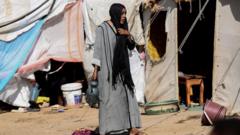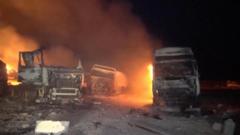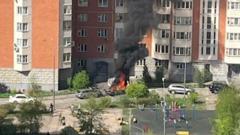At least seven individuals have lost their lives following a devastating bombing of a hospital and market in South Sudan, with increasing fears of returning to civil war as violence escalates.
**Tragedy Strikes South Sudan: Hospital and Market Bombing Claims Seven Lives**

**Tragedy Strikes South Sudan: Hospital and Market Bombing Claims Seven Lives**
Charity reports escalating violence raises concerns of imminent civil conflict in South Sudan.
In a harrowing incident, a medical charity has confirmed that helicopter gunships targeted the pharmacy of a hospital operated by Doctors Without Borders (MSF) in Old Fangak, Jonglei state, resulting in destruction and chaos. According to MSF, the attack began with a bombing of the hospital, the sole medical facility in Fangak county catering to a population exceeding 110,000, rendering critical medical supplies unusable. The charity condemned the attack, labeling it a "clear violation of international humanitarian law," as it also resulted in around 20 injuries.
Nicholas Haysom, leading the UN mission in South Sudan, has expressed grave concerns over the country's precarious position, suggesting it is on the brink of a return to widespread civil war. These sentiments have intensified in light of tensions between President Salva Kiir and Vice-President Riek Machar. Just hours before the disastrous bombing, the army’s chief threatened retaliatory actions against militia groups allegedly tied to Machar, who himself has faced scrutiny and arrest for purportedly inciting rebellion.
The backdrop of this crisis is severely troubling: South Sudan emerged as an independent state from Sudan in 2011, only to succumb to civil war within two years when President Kiir dismissed Machar, accusing him of plotting a coup. This brutal conflict, primarily fought along ethnic lines, resulted in approximately 400,000 deaths and displaced over 2.5 million people, highlighting the depths of societal fragmentation.
While a peace deal was brokered in 2018, establishing a unity government with Kiir and Machar, the promise of elections and a unified military force has not been fulfilled, leaving numerous armed factions loyal to various political leaders. The crisis has seen escalating incidents of violence, including clashes involving the White Army militia and the military.
Rights organizations have called urgently for an end to military actions in civilian areas, as South Sudan grapples with the potential resurgence of a devastating conflict.
Increased scrutiny and assistance from international bodies may be crucial to alleviating the humanitarian crisis in South Sudan, as the shadow of war looms ominously over the nation.
Nicholas Haysom, leading the UN mission in South Sudan, has expressed grave concerns over the country's precarious position, suggesting it is on the brink of a return to widespread civil war. These sentiments have intensified in light of tensions between President Salva Kiir and Vice-President Riek Machar. Just hours before the disastrous bombing, the army’s chief threatened retaliatory actions against militia groups allegedly tied to Machar, who himself has faced scrutiny and arrest for purportedly inciting rebellion.
The backdrop of this crisis is severely troubling: South Sudan emerged as an independent state from Sudan in 2011, only to succumb to civil war within two years when President Kiir dismissed Machar, accusing him of plotting a coup. This brutal conflict, primarily fought along ethnic lines, resulted in approximately 400,000 deaths and displaced over 2.5 million people, highlighting the depths of societal fragmentation.
While a peace deal was brokered in 2018, establishing a unity government with Kiir and Machar, the promise of elections and a unified military force has not been fulfilled, leaving numerous armed factions loyal to various political leaders. The crisis has seen escalating incidents of violence, including clashes involving the White Army militia and the military.
Rights organizations have called urgently for an end to military actions in civilian areas, as South Sudan grapples with the potential resurgence of a devastating conflict.
Increased scrutiny and assistance from international bodies may be crucial to alleviating the humanitarian crisis in South Sudan, as the shadow of war looms ominously over the nation.





















